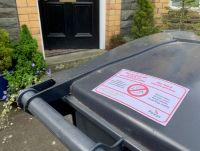Food waste - recycle it, don't bin it!

30 May 2023

The council's waste awareness and enforcement team will be joining the recycling crews across the county to see how many of us are recycling our food waste correctly each week. While out on the collection rounds, the team will be leaving us a reminder to keep food waste out of the general rubbish bin and offering residents advice on how to make the most of the weekly food waste recycling collections.
Whilst most Powys households recycle everyday items such as paper and card, glass, cans, plastic bottles and cartons, many are still not recycling all their food waste. In fact, around a quarter of what's in the general rubbish bin is still food, all of which could be recycled easily in the food waste caddies.
Research has suggested that some reluctant food recyclers are put off by the 'yuck factor'. However, separating left-over food, vegetable peelings, eggshells, and all the other food waste items, from your normal rubbish bins reduces the risk of your bin getting yucky.
"The content of our food waste caddies here in Powys is collected every week." Explains Cllr Jackie Charlton, Cabinet Member for a Greener Powys. "This means that it is far less likely to start to smell and go yucky than if you put your waste food out with the rubbish in the wheeled bin that is collected every three weeks.
"Plus, when using the free food caddy liners, any potential smells and spills are kept to a minimum. "
There are other benefits to recycling food waste too, especially as it directly helps to tackle climate change. In Powys, we send our food waste to an anaerobic digestion facility, where it's turned into green energy.
Did you know:
- 32 recycled banana peels could create enough energy to power a typical home for an hour.
- 12 recycled teabags could create enough energy to fully charge a tablet.
- Recycling a caddy load of food waste could generate enough electricity to power a fridge for 18 hours.
"Powys people are already doing a great job at recycling, which is why we have any impressive recycling rate of over 68%, and food waste is where we can all easily do our bit and directly help combat the effects of climate change." added Cllr Charlton.




